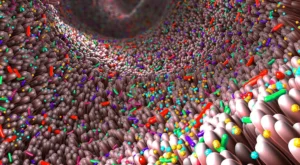By Ross Pelton, RPh, PhD, CCN
Scientific Director, Essential Formulas
Polyphenols are a large class of plant-based compounds that occur naturally in fruits, vegetables, herbs, spices tea, dark chocolate, and wine. Over 8,000 polyphenols have been identified in nature. i Polyphenols primarily function as defense mechanisms in plants against environmental stressors such as UV radiation, heat, drought, insects and fungal and bacterial pathogens. Many of these naturally occurring polyphenols have been shown to provide a wide range of health benefits. However, many polyphenols are extremely large molecules that are poorly absorbed. Hence, the mechanism of how many dietary polyphenols exert their health benefits has remained a mystery.
Dramatic advances in gene sequencing technologies and the science of metabolomics are advancing scientists’ understanding of the trillions of bacteria that live in and on the human body, known as the microbiome. Metabolomics is the study of small molecules called metabolites in bodily fluids, tissue, and breath exhalation, which are helping scientists better understand metabolism. Advances in metabolomics are helping scientists unravel the ‘mystery’ of how polyphenols provide their health benefits to humans. The answer has to do with the gut microbiome.
Because many polyphenols are poorly absorbed, they pass through the stomach and small intestines unchanged. However, when they arrive in the colon, they are ‘food’ for your probiotic bacteria. Probiotic bacteria in the colon ferment polyphenols and convert them into biologically active compounds called postbiotic metabolites. Thus, interactions between probiotic bacteria and polyphenols are an important new area of scientific research. ii
Studies are increasingly reporting a significant two-way interaction between polyphenols and gut probiotic bacteria. Polyphenols can serve as prebiotic foods that promote the growth and proliferation of probiotic bacteria and suppress growth of disease-causing, or pathogenic, bacteria. Similarly, some strains of probiotic bacteria convert polyphenols into postbiotic metabolites that have significant health benefits, such as reducing the risks of obesity, cardiovascular, and other related metabolic functions. iii
Studies on polyphenols indicate that in some cases, their health benefits are due to bioactive postbiotic metabolites that are created by probiotic bacteria. Recent studies report that many of the polyphenol postbiotic metabolites provide more biological activity and health benefits than the original nutrient consumed. iv
Some polyphenols stimulate the production of antimicrobial peptides (AMPs), which are also known as host defense peptides (HDP). These compounds are an important part of the immune system because they naturally control the growth of pathogens, without harming your beneficial probiotic bacteria.v
Examples of dietary polyphenols that are converted into biologically active postbiotic metabolites include the following:
- Rutin and quercetin are commonly found in most fruits and vegetables. vi
- Genistein and daidzein are phytoestrogens that primarily occur in soybeans and soy-based products. Both compounds are converted into metabolites that are more readily used as precursors to human hormones and active co-factors for better health.
- Curcumin undergoes biotransformation by gut bacteria into a range of bioactive metabolites. vii
- Green tea is one of the most popular beverages globally, and regular consumption leads to many health benefits including improvements in cardiovascular health, energy levels, etc. The polyphenols in green tea are metabolized by gut bacteria into postbiotic metabolites with strong antioxidant, anti-proliferative and anti-inflammatory activities.viii
Polyphenols: Nutritional Superheroes
Polyphenols provide such a wide range of health benefits that they have been referred to as nutritional superheroes.IX After ingesting polyphenol-containing foods, these compounds travel down the GI tract virtually unchanged until they reach the colon. Studies have shown that polyphenols get rapidly converted by probiotic bacteria in the colon into postbiotic metabolites that have a wide range of biological activity. Benefits of polyphenol metabolites include antioxidant activity, enhancement of immune function and protection of the intestinal barrier.X Consumption of polyphenols also has a beneficial effect on the microbiome, improving the amount of beneficial bacteria and decreasing less desirable strains.
Now more than ever, researchers are realizing the importance of eating a wide range of plant-based foods. Most plant-based foods provide both fiber and polyphenols. Probiotic bacteria convert these into postbiotic metabolites, which have many important health-regulating benefits.
Examples of dietary polyphenols that are converted into biologically active postbiotic metabolites include the following:
- Rutin and quercetin are commonly found in most fruits and vegetables
- Genistein and daidzein are phytoestrogens that primarily occur in soybeans and soy-based products. Both compounds are converted into metabolites that are more readily used as precursors to human hormones and active co-factors for better health.
- Curcumin undergoes biotransformation by gut bacteria into a range of bioactive metabolites.
- Green tea is one of the most popular beverages globally, and regular consumption leads to many health benefits including improvements in cardiovascular health, energy levels, etc. The polyphenols in green tea are metabolized by gut bacteria into postbiotic metabolites with strong antioxidant, anti-proliferative and anti-inflammatory activities.
The human gut microbiome plays a vital role in the metabolism of the chemical compounds that occur in food. In many cases, bacterial metabolism reduces the activity of dietary compounds. However, scientists have now established that dietary fibers, which serve as “food” for probiotic bacteria, get converted into important health-regulating compounds referred to as postbiotic metabolites.
Scientists are now realizing that probiotic bacteria also metabolize non-fiber dietary compounds such as polyphenols into health-promoting postbiotic metabolites. Now more than ever, researchers are realizing the importance of eating a wide range of plant-based foods. Most plant-based foods provide both fiber and polyphenols. Probiotic bacteria convert these into postbiotic metabolites, which have many health-promoting benefits.




